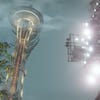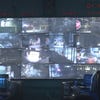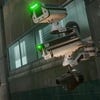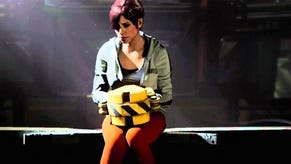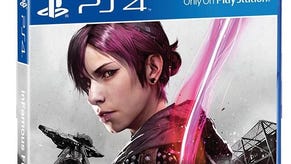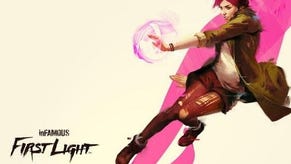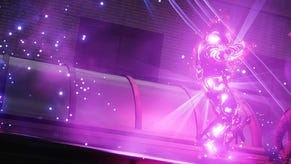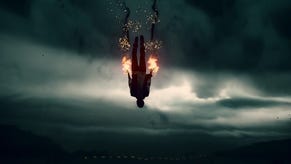Almost inFamous: Nate Fox talks Second Son
"Have you ever been turned into a GIF? It's like a curse."
Rewind a year to the very first reveal of the PlayStation 4, and it's easy to assume that everyone within Sony was enjoying one of the best nights of their careers. For the executives, it was a chance to establish the new console as a powerhouse dedicated to gaming, and for the developers a chance to show what Sony's machine was capable of. Sucker Punch's Nate Fox was certainly grateful for the opportunity, but his turn on stage to reveal Second Son, the latest instalment in the open-world series inFamous, was to become a thing of infamy in itself.
"Jeez," smiles Fox as he speaks to us at a press event for the game in an East London warehouse. "That is the most professionally humiliating thing I've ever encountered, I'll be honest. I had this speech that I had timed against a video above my head, and every now and then I'd stop speaking - not for dramatic effect - but the imagery above my head, it was an animation, so it was for an explosion or a switcheroo.
"The cameraman who was filming the event, he clearly didn't know the interesting thing was above me - so he left the camera on me. I'd stop in a sentence like Captain Kirk or something, waiting, waiting and then talking again. As a result of that, there's an uncomfortable GIF of me with my arm bobbing up and down like one of those Korean cats in the windows of shops. Have you ever been turned into a GIF? Let it never happen to you. It's like a curse."
Just over a year later, and Nate Fox is on the brink of what could well be one of the best moments of his career, with the release of inFamous: Second Son - the first Sony-published game to come out since the very first wave of titles that accompanied the PlayStation 4's launch last November. The third outing for Sucker Punch's own brand of superhero action, it's the first to be made since the studio was acquired by Sony in 2011. For a studio that's created all but one of its games on Sony's hardware - 1999's Rocket: Robot on Wheels on the Nintendo 64 - the change in ownership has had little impact on the day to day life within the Bellevue offices.
"When your core DNA is someone getting superpowers and using them for good and evil - that's pretty wide. It could be in any country, in any time, and you can still get that kind of basic conceit."
"Honestly it's not any different at all," says Fox. "One thing that makes Sony - I believe - successful in dealing with first-party developers, and why they tend to produce good games, is because they give developers a lot of rope, a lot of freedom, and they trust them. The same trust we had when we were independent we have now that we're owned by them."
There have, of course, been advantages, and ones keenly felt by Sucker Punch as it worked alongside Sony in preparing the PlayStation 4. "One thing that's totally different, because we're owned by Sony, while they were developing the PS4 we had access to prototype controllers. We knew about the specs earlier. All that early, early access, and they really took our comments into consideration. That wouldn't have happened before. And it felt good. We were working on PCs that were targeted at what we thought the PS4 was going to be - then as we got information on what it would be, we'd monkey around with those PCs and curve our game engine towards what the ultimate hardware would be."
The results, perhaps unsurprisingly, are spectacular. Sucker Punch switched over to an all-new engine (Fox is nicely candid about his ignorance of that side of development - "I went to art school - I don't know how to program anything! The programmers smiled a lot, so they seemed to like it") and the benefits are there to see in every little detail that's been crammed into Second Son's take on Seattle. Neon bursts out from the numerous coffee shops, while scamper up to roof level and a dense bustle reaches out for blocks on end. "If you look at the graphics in Second Son compared to inFamous 2, we really lapped ourselves," says Fox. "I feel like that can only be because it's easier to work with the hardware, right?"
Second Son's improvements are reaching further into the game, too. There's a tightening of systems and a more refined approach to combat. It's a team effort, of course, but you can't help but pin the arrival of Jaime Griesemer, a former Bungie veteran who served as one of the architects of the Halo series' core pillars of fun, as having something to do with the new approach. "Jaime is a very accomplished combat designer. He really understands the feel of the way that the heroes' abilities interact with enemy AIs, and how enemy AIs can do intelligent things to test the player. The controller feel for Second Son has been revamped - it's more streamlined - and that's really Jaime's good work. A lot of the powers we have in the game come from a couple of programmers, and the streamlined interface is definitely Jaime." [Shortly before this article was published, we learned that Jaime Greisemer has left Sucker Punch.]
Shifting to a new console has meant a new start for the series, with the protagonist of the first two games, Cole McGrath, being ditched in favour of Delsin Rowe, an instantly likeable 24-year-old artist brought to life via the talents of Troy Baker. There's every sign that a series that's perhaps struggled to find a strong character of its own - McGrath himself was redesigned significantly between the first two games, before fan feedback led to him keeping his original look - has found the striking lead it needs.
Not that it was always going to be that way, and the decision to ditch McGrath was one made by the players, albeit unwittingly. "We looked at player trophies on PSN for inFamous 2," says Fox. "You'd get one if you got the evil or the good ending. 78 per cent of people decided to sacrifice Cole, so we said, alright, these are the votes. Whether they knew it or not, they were voting - and this is the way that the franchise will change. We view the series as being about choice and consequence, and it seemed relevant to make that a deciding factor."
Did the rejection of Cole, a creation that was dear to many of the Sucker Punch team, hurt a little? "Yes!" cries Fox with no small sense of relief. "I wrote the evil ending of the game to be the continuation. We worked on him for so long, and the world was in a good spot so that's what I was hoping it would be. I was definitely grumpy. But! I'm happy now that it ended up the way it did. With a new hero, new powers and a new story it's a lot easier for people who've never played inFamous to get into the series. You don't have to have played the first two games to get it. If you have played those games, you'll notice some references, and it'll be a deeper experience."
The arrival of Second Son suggests that Sucker Punch is content sticking within the inFamous universe and has plans to stick around a while longer. Already, the studio's preparing a significant DLC drop for the PS4 game - "You should think of it in the same kind of scope as our old Festival of Blood," says Fox - as well as thinking further beyond. Whereas other Sony studios such as Naughty Dog are broadening their palette with the likes of The Last of Us, the world of inFamous still holds many more possibilities for Fox and his team.
"When your core DNA is someone getting superpowers and using them for good and evil - that's pretty wide. It's as wide as superhero fiction. So it's easy to get excited when you think, oh - it could be a man or a woman. It could be old or young. It could be any country, in any time, and you can still get that kind of basic conceit. I would love to go and do a more mature thing. But for what it's worth, even though inFamous is PEGI 16, we try to be earnest in the way that characters interact with each other. It's emotionally real - and that reality, it's hard to not want to invest more in future titles as well."



